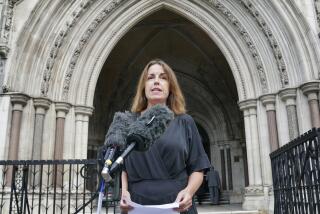Britain’s Parliament to Investigate Basis for War
- Share via
LONDON — A parliamentary committee announced Tuesday that it would hold an inquiry into the government’s decision to go to war with Iraq, as pressure mounted on Prime Minister Tony Blair to explain claims that Saddam Hussein had chemical, biological or nuclear weapons.
The existence of such weapons was Blair’s main argument for joining the United States in military action. Yet British and U.S. forces in Iraq have so far failed to locate banned arms or programs to develop them.
The House of Commons Foreign Affairs Committee is likely to hold its investigation in public, and its reports are usually published.
The inquiry will consider whether the Foreign Office, “within the government as a whole, presented accurate and complete information to Parliament in the period leading up to military action in Iraq, particularly in relation to Iraq’s weapons of mass destruction,” the committee said.
Controversy has focused on a government dossier, published in September, outlining evidence that Iraq had such weapons, along with plans to deploy them on 45 minutes’ notice.
More than 50 Labor lawmakers have signed a Commons motion drafted by Peter Kilfoyle, a former Labor defense minister, calling on the government to publish the evidence behind the dossier.
The committee said it plans to take oral statements from witnesses in June and publish a report in July.
No witness list has been drawn up, but Donald Anderson, chairman of the Foreign Affairs Committee, said the committee may call Blair, Foreign Secretary Jack Straw and intelligence officers.
“All options are open. We would aim to get as wide a range of witnesses as possible,” he said. “The obvious concern we would be addressing is the quality of intelligence material and the use of that material.”
More to Read
Sign up for Essential California
The most important California stories and recommendations in your inbox every morning.
You may occasionally receive promotional content from the Los Angeles Times.













